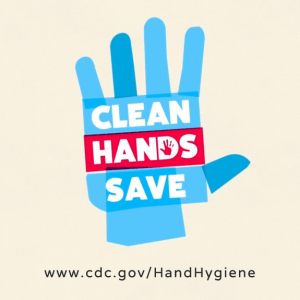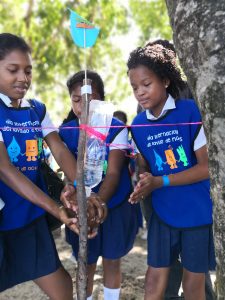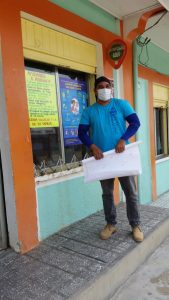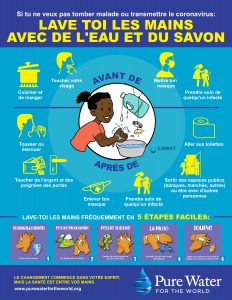 May 5 is Global Hand Hygiene Day.
May 5 is Global Hand Hygiene Day.
The goal of the Global Hand Hygiene Day campaign is: “to recognize that handwashing is one of the most effective actions you can take to reduce the spread of pathogens and prevent infections, including the COVID-19 virus. Health workers and community members alike can play a role in preventing infections by practicing regular and frequent handwashing.” (learn more)
Following is an excerpt from an email message sent by PWW partner, Millennium Water Alliance, on Global Hand Hygiene Day…
“The U.S. Centers for Disease Control and Prevention and the United Nations declared May 5 to be Global Hand Hygiene Day, as WASH organizations around the world work hard to help the poorest communities in the world deal with the COVID-19 pandemic. All of MWA’s 18 member organizations include hygiene education in their programs, working in more than 90 countries around the world.
The pandemic has sharpened global attention to handwashing as a way to fight this pandemic and other disease outbreaks – but as we and others have long advocated, to practice effective hygiene, people need access to clean, safe water, and to soap. Building handwashing stations, improving water supply, and building overall WASH systems (including regular public education on the need for better hygiene practices) are the bedrock of this effort.”
Since 2009, Pure Water for the World programs have integrated the critically important aspect of proper handwashing techniques into all WASH (water, sanitation and hygiene) programs.
 From 2009-March 2020, PWW teams have held 128 personal hygiene workshops in Honduras, which have included proper handwashing practices, reaching over 27,000 individuals across 154 communities. In this same timeframe, PWW Haiti teams have reached over 600,000 individuals with handwashing messaging, including 539,034 students and across six regions in Haiti.
From 2009-March 2020, PWW teams have held 128 personal hygiene workshops in Honduras, which have included proper handwashing practices, reaching over 27,000 individuals across 154 communities. In this same timeframe, PWW Haiti teams have reached over 600,000 individuals with handwashing messaging, including 539,034 students and across six regions in Haiti.
Partnerships are important to creating greater impact, and PWW has established partnerships in both Haiti and Honduras. In relation to healthy hygiene practices, PWW partners with UNICEF in both Haiti and Honduras, as well as with Anacaona in Haiti, to expand hygiene and handwashing activities, reach and impact.
In partnership with CAWST (Center for Affordable Water and Sanitation Technologies), PWW has established a WET (Water Expertise Training) Center in Honduras and provides a wide-range of WASH Training and Consulting Services in both Honduras and Haiti. PWW WASH teams deliver hygiene training programs (as well as additional water and sanitation programs) to teachers, businesses, government agencies, and many other organizations.
Access to handwashing stations is a critical element to successful hygiene training programs. In Haiti, the PWW team has completed 19 handwashing stations in schools. In Honduras, the PWW team has constructed 55 basic handwashing stations as well as 66 complete WASH stations (latrines with handwashing stations) in schools.
 In response to COVID-19, the PWW teams have continued to create an impact on underserved communities.
In response to COVID-19, the PWW teams have continued to create an impact on underserved communities.
- In Honduras, team has been:
- Distributing instructional messages (via radio, videos, and website) to support the at-home construction of TipiTap handwashing systems.
- Creating instructional posters and placing in high-traffic areas (including grocery stores, banks, pharmacies, gas stations and health centers) that highlight key messaging about proper handwashing and mask-wearing practices.
- Identified as “essential” by local governments, the PWW team is continuing with WASH implementation in schools as well as assisting the health center with training community members about safe hygiene practices.
- As part of the Emergency Response Committee in Trojes, the PWW team is working to build public latrines at entry points into the region.
- These measures are expected to impact an estimated 60,500 individuals.
 In Haiti, the team has been:
In Haiti, the team has been:
- Using TV, radio, websites, email, and WhatsApp to instruct people how to make a TipiTap handwashing systems at home.
- Distributing posters about safe and proper handwashing and mask-wearing practices.
- Reaching out to partners and Community Agents with training messages and resources to spread among their respective community members.
- These programs are expected to reach an estimated 10,000-15,000 people every day.
